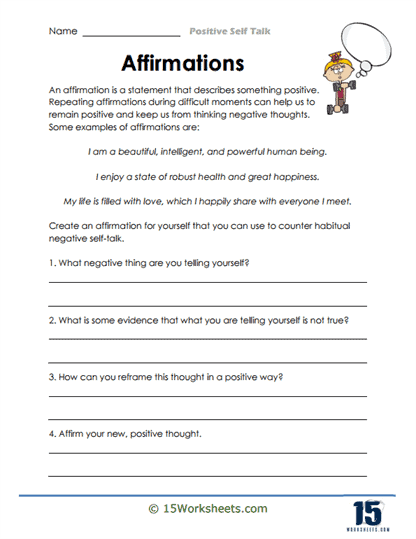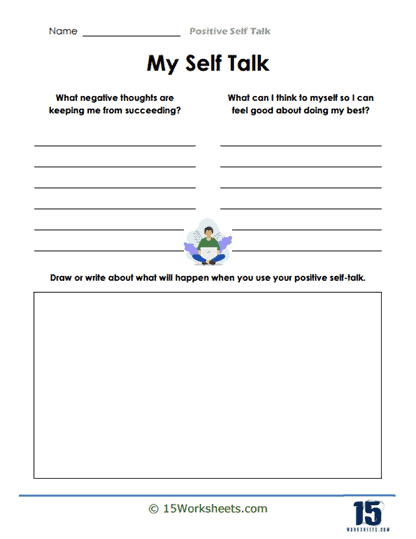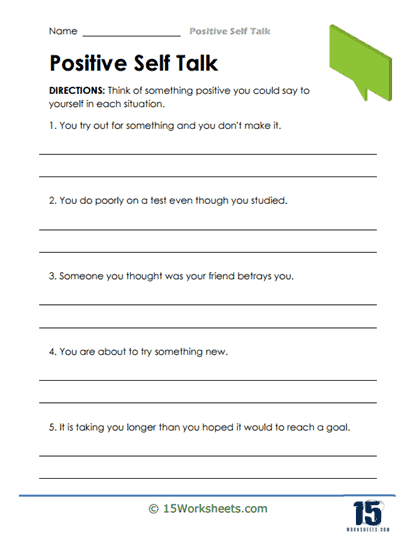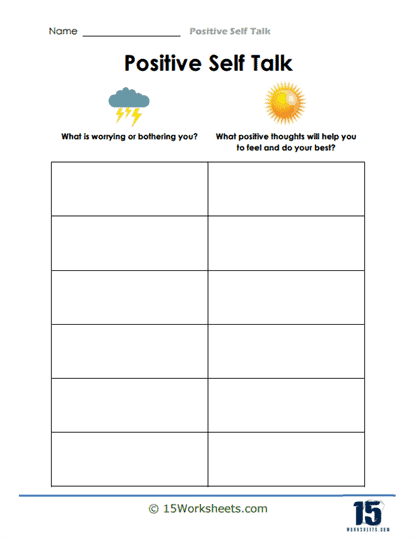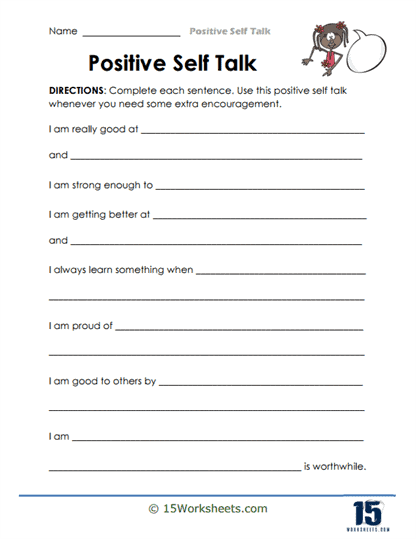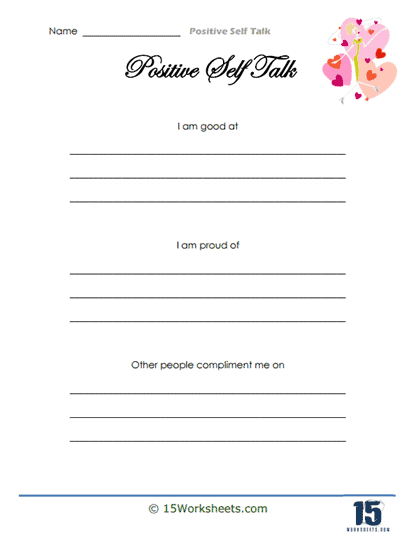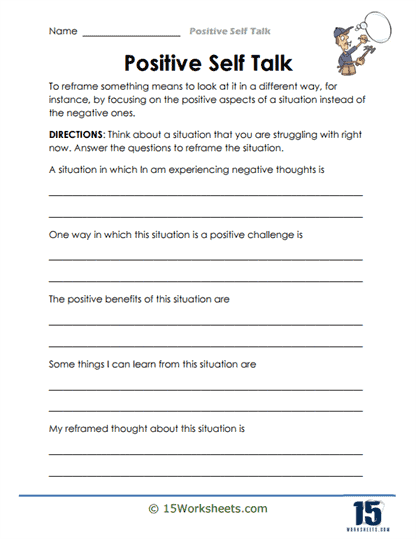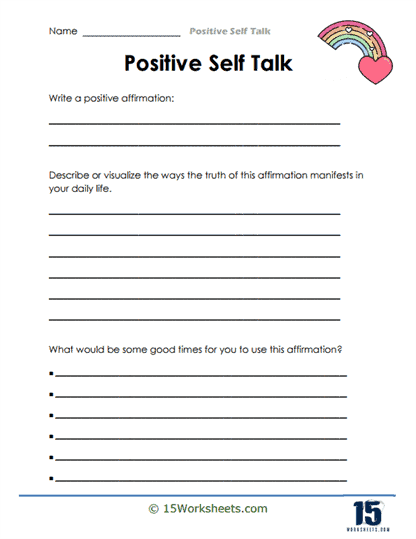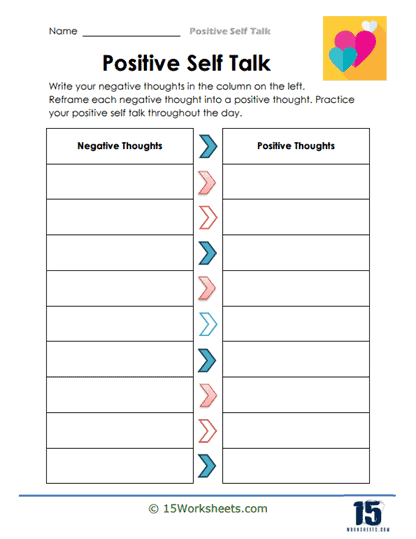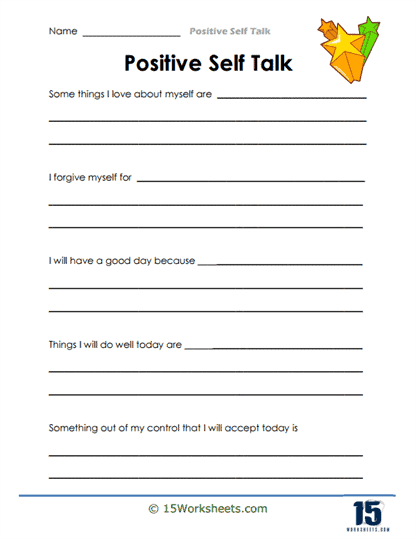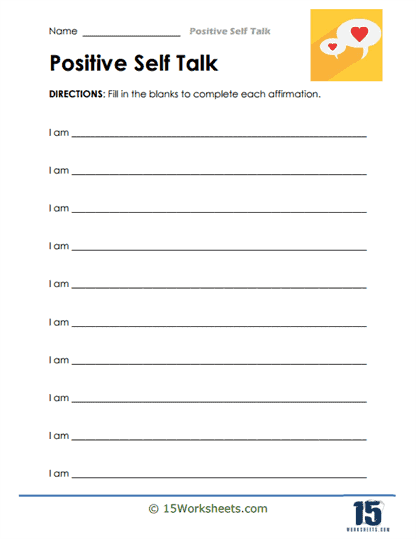Positive Self Talk Worksheets
All About These Worksheets
Positive self-talk worksheets offer a valuable tool for children, enabling them to identify, challenge, and reframe negative or unhelpful thoughts into more constructive and empowering ones. At its core, positive self-talk is about reshaping the internal dialogue that often plays in our minds-those automatic thoughts that influence how we perceive ourselves and the world around us. For kids, who are still developing their sense of self and emotional regulation, these worksheets can be particularly transformative. By actively engaging in positive self-talk exercises, children learn to question the negative voices in their heads and replace them with affirming messages that foster growth and confidence. This process not only encourages a healthier mental outlook but also equips them with skills to navigate challenges with greater resilience and self-awareness.
One of the most significant benefits of practicing positive self-talk is the impact it can have on a child’s self-esteem. Many children struggle with self-doubt, often internalizing criticism from others or comparing themselves unfavorably to their peers. Left unchecked, these patterns of thinking can erode self-confidence and lead to feelings of inadequacy. Positive self-talk worksheets provide structured opportunities for children to actively counteract these negative beliefs. By guiding them through exercises that encourage positive affirmations and a more optimistic view of their abilities, these worksheets help to bolster a child’s belief in their own worth and potential. As a result, children who consistently practice positive self-talk are likely to experience a gradual, yet profound, improvement in their self-esteem, which can have a lasting impact on their social interactions, academic performance, and overall happiness.
Beyond self-esteem, positive self-talk plays a crucial role in building resilience-the ability to bounce back from adversity. Life, even at a young age, comes with its fair share of setbacks and disappointments. Whether it’s a challenging test at school, a disagreement with a friend, or a personal failure, children who have been taught to engage in positive self-talk are better equipped to manage these difficulties. The process of recognizing negative thoughts and reframing them in a positive or neutral way allows kids to approach problems with a growth mindset. Instead of feeling defeated by a temporary setback, they can view it as an opportunity to learn and improve. This shift in perspective not only helps them overcome challenges in the moment but also lays the foundation for a lifetime of emotional resilience.
Motivation is another key area where positive self-talk can have a powerful influence. Children often face tasks that seem daunting or overwhelming, whether it’s completing homework, preparing for a presentation, or learning a new skill. Negative self-talk-such as thoughts like “I’m not good at this” or “I’ll never be able to do it”-can easily drain motivation and make the task seem even more insurmountable. Positive self-talk worksheets, however, can help children reframe these thoughts into more encouraging ones, such as “I can try my best” or “I’ll improve with practice.” When children learn to replace discouraging thoughts with empowering ones, they are more likely to stay motivated and persevere through challenges, which ultimately leads to greater success and personal growth.
The underlying concept of positive self-talk worksheets is based on the idea that our thoughts significantly shape our emotions, behaviors, and overall mindset. This concept is rooted in cognitive-behavioral theories, which suggest that by changing the way we think, we can change the way we feel and act. For children, learning this at an early age can be life-changing. By developing the habit of recognizing negative thought patterns and intentionally replacing them with positive, constructive alternatives, children can cultivate a more optimistic and solution-focused mindset. This shift doesn’t just benefit their mental and emotional health in the short term; it also equips them with lifelong tools for managing stress, building confidence, and fostering healthy relationships with themselves and others.
Types of Exercises
Thought Recognition – Helps students identify and list their recurrent negative thoughts. Students write down any negative thoughts they experience throughout the day or week. By recognizing these thoughts, individuals become more aware of their patterns of thinking. Makes students realize the frequency and impact of their negative thoughts, serving as the first step in the transformation process.
Thought Challenging – Teaches students to question the validity and logic of their negative thoughts. For each negative thought listed, students are prompted to find evidence that supports and contradicts that thought. This helps them see the thought from a more objective perspective. By challenging thoughts, students learn that many of their automatic negative thoughts may not be rooted in reality or facts.
Reframing – Aims to help students convert negative thoughts into neutral or positive ones. Students take each negative thought and rephrase it in a more positive or neutral light. For example, changing “I’m a failure” to “I didn’t succeed this time, but I can learn and try again.” Teaches students the skill of cognitive flexibility, demonstrating that there’s more than one way to perceive a situation.
Affirmations – Encourages the practice of daily positivity. Students create a list of positive affirmations, statements that reflect a positive belief or mindset, such as “I am capable” or “Every challenge is an opportunity.” Regularly repeating positive affirmations can help instill and reinforce a positive self-image.
Gratitude Journaling – Focuses on recognizing and appreciating the good in life. Students list things they are grateful for every day, whether big or small. Cultivating gratitude can shift focus away from what’s lacking or negative to what’s abundant and positive in life.
Visualization – Reinforces positive outcomes and experiences. Students are guided to visualize a situation where they’re using positive self-talk and experiencing success. This can be in overcoming a challenge, achieving a goal, etc. By visualizing positive scenarios, students can build confidence and optimism towards future situations.
Mirror Work – Strengthens self-love and acceptance. Students stand in front of a mirror, looking into their own eyes, and repeat positive affirmations or statements of self-love. This can be an impactful way of internalizing positive beliefs about oneself.
Identifying Triggers – Helps students recognize situations or stimuli that often lead to negative self-talk. Students list situations or events that tend to spark negative thoughts, allowing them to be more prepared or avoid them if possible. By identifying triggers, students can develop coping strategies and reduce the onset of negative self-talk.
Benefits and Impact
Engaging with positive self-talk worksheets and actively participating in the exercises they contain can provide numerous transformative benefits, shaping both mental well-being and personal growth. These tools are more than just structured exercises-they serve as a gateway to developing healthier thought patterns, fostering resilience, and cultivating a positive mindset that impacts various aspects of life.
One of the key benefits is an increase in self-awareness, which is foundational for personal development. By working through these worksheets, individuals are encouraged to take a closer look at their internal dialogue and thought patterns. Often, we may not realize how pervasive negative thoughts can be, and recognizing them is the crucial first step toward change. Positive self-talk exercises help individuals identify the self-sabotaging thoughts that may be holding them back, creating an opportunity to pause and reflect on whether those thoughts are helpful or harmful. By becoming more conscious of these internal patterns, a person can begin to shift from automatic negative thinking to more constructive and mindful responses, empowering them to take control of their emotional and mental states.
Another profound benefit is the enhancement of self-esteem. Replacing critical or negative self-talk with more supportive and positive statements plays a pivotal role in boosting one’s self-worth. Constant self-criticism can erode confidence over time, making it difficult to see personal strengths and accomplishments. Through positive self-talk, individuals learn to reframe their inner dialogue, acknowledging their achievements and qualities with compassion rather than judgment. This shift not only elevates how one views themselves but also influences how they interact with the world, fostering a sense of confidence and security. A person who practices positive self-talk begins to approach challenges with a mindset that says, “I am capable,” rather than one filled with doubt and self-deprecation.
Stress reduction is another significant advantage of practicing positive self-talk. Life’s challenges can often feel overwhelming, and without the right mindset, stress can quickly escalate. By engaging in these exercises, individuals learn to reframe their perception of difficulties, viewing them as manageable rather than insurmountable. Positive self-talk encourages individuals to break down overwhelming problems into smaller, more manageable tasks, reducing the overall sense of stress. Instead of dwelling on what might go wrong, positive self-talk fosters a solution-oriented approach, promoting a sense of calm and control even in the face of adversity. This mental shift can significantly reduce anxiety and prevent stress from taking over, making day-to-day challenges feel more navigable.
An often overlooked but vital benefit is the improvement of problem-solving abilities. A positive mindset directly impacts how one approaches challenges, promoting a solution-driven rather than defeatist attitude. When individuals are stuck in negative self-talk, their focus tends to narrow, often making problems seem larger or more difficult than they are. However, through positive self-talk, the mental framework shifts from “I can’t” to “How can I?”-an empowering perspective that encourages creative thinking and persistence. This shift in focus allows individuals to tackle problems with a clear mind, considering multiple solutions and staying motivated to find the best course of action, rather than feeling overwhelmed or defeated by the challenges they face.
Regularly practicing positive self-talk fosters better resilience, allowing individuals to bounce back from setbacks more quickly. Life is full of ups and downs, and setbacks are inevitable, but how we respond to them determines how quickly and effectively we can recover. Positive self-talk equips individuals with the mental tools to view setbacks as temporary and solvable rather than permanent failures. This mindset not only improves recovery from difficult situations but also builds emotional resilience over time. Individuals who regularly engage in positive self-talk are more likely to see challenges as opportunities for growth and learning, allowing them to persevere with confidence and optimism even in the face of hardship. This resilience helps them to not only overcome obstacles but also thrive in environments that may otherwise be discouraging.





